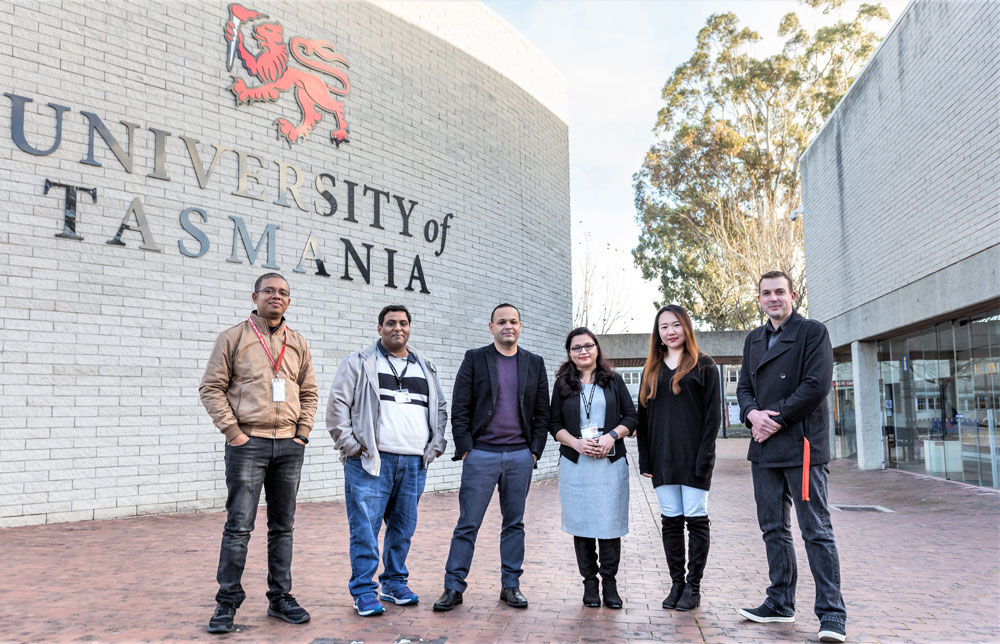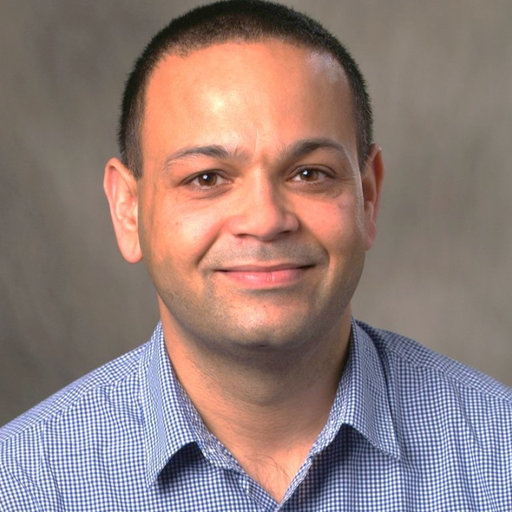The Respiratory Translational Research Group
Sohal laboratory focuses on discovering and identifying novel mechanisms that may act as exciting new therapeutic targets for treating chronic lung diseases.

The major objective of the Respiratory Translational Research Group is to translate basic discoveries in science through to clinical studies in patients for substantial health gains. Our research group investigates cellular and molecular mechanisms underlying chronic lung diseases such as chronic obstructive pulmonary disease (COPD), Lung Cancer, Asthma-COPD Overlap Syndrome (ACOS), Asthma, Pulmonary hypertension, Idiopathic pulmonary fibrosis (IPF) and Lymphangioleiomyomatosis (LAM). Effects of electronic smoking devices on lung health such as e-cigarettes and heat-not-burn device IQOS. Our work is based in clinical human setting, involving primary cell culture models, bronchial biopsies, resected lung tissue, blood samples and bronchioalveolar lavage (BAL). We also focus on pre-clinical mouse models of chronic lung disease and in-vitro cell line models. Our lab has been recognised as National Centre for Lung Disease Research. External collaborators include Respiratory Physicians and Pathology Scientists at Launceston General Hospital (LGH), Northwest Burnie Hospital (NWBH) and Royal Hobart Hospital (RHH).
Expertise
- Pathogenesis of respiratory diseases
- Epithelial and endothelial cell plasticity (EMT and EndoMT)
- Airway remodeling
- Effects of inhaled corticosteroids (ICS)
- Inflammation
- Fibrosis
- Smoking cessation
- Effects of electronic smoking devices
- Vascular remodelling
- Autophagy
- Respiratory microbiology
Projects
Airway macrophage dichotomy in smokers and COPD.
The M1/M2 phenotype balance has also been especially discussed in the cancer literature as an orchestrator of EMT in driving epithelial malignancies. Such new and translatable insights in COPD are an international priority given the current absence of any significant disease trajectory-modifying drug interventions in clinical practice. Here we continue to focus on EMT in COPD, but especially investigating the role of macrophage-associated cytokines in driving EMT in different patient groups leading to new therapeutic targets.
Role of endothelial to mesenchymal transition (EndoMT) in pulmonary hypertension and interstitial fibrosis in idiopathic pulmonary fibrosis (IPF).
The results of numerous recent studies indicate that activation of endothelial (vessel) cells and their transition into collagen-producing myo-fibroblasts (EndoMT) is likely to play an important role in the pathogenesis of organ fibrosis in general. We hypothesize the confirmation of active EndoMT in IPF lungs and elucidation of the molecular mechanisms will provide the deep understanding for new therapeutic approaches in IPF.
Impact of maternal vaping on lung infection and asthma development in the offspring.
To our knowledge, this is the first study aiming to investigate a causal link between maternal eCig vapour and development of asthma and infections in the early life of the offspring. Using a mouse model, we aim to determine the impact of continuous maternal eCig vaping from pre-gestation on development of early-onset allergic asthma in offspring and lung pathophysiological change during lung infection.
Understanding asthma-chronic obstructive pulmonary disease overlap syndrome (ACOS).
Asthma and COPD are typically characterised as separate diseases with different clinical features, pathophysiological mechanisms and strategies for treatment. Some respiratory patients appear to have features of both diseases, i.e. a history of asthma and usually smoking, with marked fixed airflow obstruction, which is termed asthma-chronic obstructive pulmonary disease overlap syndrome (ACOS). Exacerbation rates are also quite high in ACOS patients compared to asthma or COPD alone. There is very little known about the disease and it is difficult to manage clinically because the underlying disease mechanisms are poorly understood.
Origins of destructive fibrotic cells in Lymphangioleiomyomatosis (LAM).
LAM is a rare disorder that affects women, especially during their reproductive age, by progressively destroying the lungs leading to complete incapacitation. There have been very few effective therapies available yet, with the highly invasive lung transplantation being the only option available as a possible cure. This in part is because many aspects of the underlying pathogenesis remain a mystery and needs urgent deciphering. Interestingly, cells in LAM patients share identical morphological and cellular signatures to other fibrotic and malignant disorders such as IPF, COPD and lung cancer. Our experience in these diseases would suggest that epithelial cells could be the possible source of LAM cells through EMT.
Microbial pathogenesis and dysfunctional immunity
Infectious exacerbations are a primary driver of clinical and functional decline in chronic lung disease such as COPD and IPF, but existing therapies are of limited effectiveness and do not affect the overall course of the disease. The rapid development of antibiotic resistance and microbial evasion of vaccination strategies further complicates the treatment and prevention of these infections. In order to mount an infection, a pathogen must exploit host-cell surface receptors for attachment and evade clearance by host immune responses. Therefore, novel therapeutic strategies that disrupt bacterial-host cell interactions or that mediate the host inflammatory response present an attractive approach to reducing infectious exacerbations in COPD. Modulation of the aberrant inflammatory response in COPD by altering immune cell function, signalling pathways, balancing the microbiome or reducing oxidative burden may have added utility of affecting disease progression as well as preventing infectious exacerbations. However, due to the integrated nature and complexity of the immune response, a combination of approaches may be required to elicit any benefits.
Respiratory probiotic development
Non-typeable Haemophilus influenzae (NTHi) are very important opportunistic pathogens responsible for a large proportion of acute infectious exacerbations of COPD. Since infection with NTHi is preceded by nasopharyngeal colonisation, an intervention that inhibited this colonisation might be a useful strategy to reduce subsequent infection. Our group has discovered a closely related but non-disease-causing bacterium, Haemophilus haemolyticus, that produces a novel protein that inhibits NTHi by starving NTHi of essential nutrients. The current research project is using in vitro and in vivo colonisation studies to show that this Haemophilus haemolyticus is protective against colonisation with NTHi, with a view to translating this into a probiotic preventative therapy.
Emerging antibiotic resistance mechanisms
Haemophilus influenzae has recently been included on the World Health Organisation “Priority Pathogen” list because their antibiotic resistance is considered a significant threat to effective treatment. Widespread resistance to amoxicillin is the major concern, however treatment is still possible by using the widely available combination antibiotic “amoxicillin-clavulanate” to which almost all strains are still susceptible. Our group has recently gained access to very novel strains of H. influenzae that are amoxicillin-clavulanate resistance. We are currently characterising the molecular mechanisms behind the resistance and developing laboratory tests to allow the resistance to be more easily detected in routine pathology laboratories. This translational work will be important in guiding appropriate treatment for individual patients and for monitoring the spread of this antibiotic resistance.
Group Leader(s)
Affiliation
Laboratory Medicine
School of Health Sciences
Contact
Email: Sohal_Lab@utas.edu.au
Group members
- Dr Wenying (Monica) Lu (Research Associate and Lab Manager)
- Dr Mathew Eapen (Research Associate)
- Mr Sam Brake (Research Officer and PhD student)
- Mrs Archana Vijay Gaikwad (PhD student)
- Mr Surajit Dey (PhD student)
- Assoc Prof Heinrich Weber
- Prof Dominic (Dom) Geraghty
- Dr Stephen Tristram
- Dr Stephen Myers
- Assoc Prof Andrew Williams
- Dr Kiran Ahuja
- Dr James Markos (Respiratory Consultant, LGH)
- Dr Collin Chia (Respiratory Consultant, LGH)
- Dr Josie Larby (Respiratory Consultant, LGH)
- Dr Greg Haug (Respiratory Consultant, LGH)
- Dr George Mabeza (Respiratory Consultant, NWBH)
- Dr Sally Young (Senior Respiratory Scientist, North West Lung Function Unit)
- Dr Ashutosh Hardikar (Cardiothoracic Surgeon, RHH)

Additional Information
Research Group Socials
- Facebook: https://www.facebook.com/RTRGUTAS/
- Twitter: https://twitter.com/Sohal_LabRTRG
Dr Sukhwinder Sohal
- Twitter: https://twitter.com/romy_sohal
- Linkedin: https://au.linkedin.com/in/sukhwinder-sohal-au
- Research Gate: https://www.researchgate.net/profile/Sukhwinder-Sohal-2
